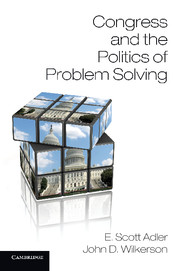Book contents
- Frontmatter
- Contents
- Tables and Figures
- Preface
- Part I
- 1 Congress and the Politics of Problem Solving
- 2 Problem-Focused Voters and Congressional Accountability
- 3 Congressional Approval and Incumbent Accountability
- Part II
- Part III
- Part IV
- Appendix A
- Appendix B Assignment of Bills across Issue Types
- Appendix C Calculating Committee Roll Rates
- Bibliography
- Index
3 - Congressional Approval and Incumbent Accountability
Published online by Cambridge University Press: 05 January 2013
- Frontmatter
- Contents
- Tables and Figures
- Preface
- Part I
- 1 Congress and the Politics of Problem Solving
- 2 Problem-Focused Voters and Congressional Accountability
- 3 Congressional Approval and Incumbent Accountability
- Part II
- Part III
- Part IV
- Appendix A
- Appendix B Assignment of Bills across Issue Types
- Appendix C Calculating Committee Roll Rates
- Bibliography
- Index
Summary
Voting will be easy this year. Incumbents: out. Non-incumbents: in.
A voter (Rochester Business Journal 2010)Surveys indicate that voters are willing to blame or credit both parties for Congress’s job performance. Pundits and lawmakers warn of the electoral consequences of legislative gridlock for incumbents of both parties (Capehart 2010). Yet, within legislative studies, the notion that public attitudes toward Congress influence congressional election outcomes, or that electoral credit or blame extends to incumbents of both parties, is not widely accepted. Evaluations of Congress, according to the conventional view, “have very little influence on how Americans vote in congressional elections. When it comes to choosing candidates for Congress, it is opinions of the president’s performance that matter” (Abramowitz 2010).
In this chapter, we propose and test a theory of collective congressional performance accountability. Voters, armed with basic knowledge of who the incumbent is and a sense of current social and economic conditions, decide whether to support the incumbent or vote for change. This congressional performance rule better accords with what voters know about candidates and Congress than existing retrospective voter theories that assume partisan performance accountability. We then test the evidence for these competing theories by examining the impact of congressional approval in House elections in four different ways: at the microlevel of the individual voter and at the macrolevel of district-wide incumbent vote share, probability of reelection, and retirement rates. We find that congressional approval significantly affects support for incumbents of the majority and minority parties and that its impact is similar to other centerpiece variables of congressional elections research, such as challenger quality, candidate ideology, and incumbency status.
- Type
- Chapter
- Information
- Congress and the Politics of Problem Solving , pp. 31 - 50Publisher: Cambridge University PressPrint publication year: 2013



